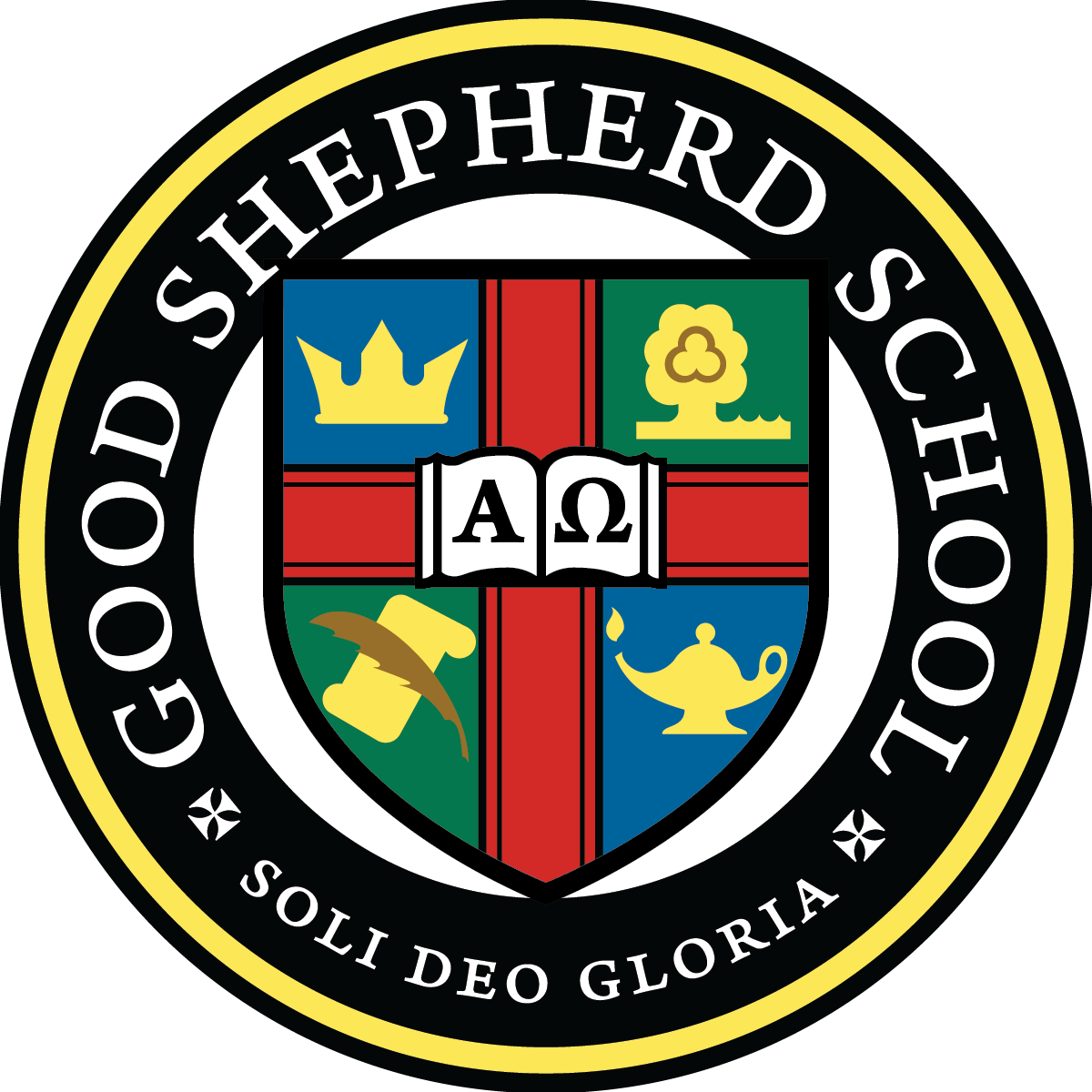“Kindergarten at Good Shepherd opens up a new world to children.”

Children enrolled in Good Shepherd School’s Kindergartens are trained in important basic skills including recognizing left and right; vocabulary for size, direction, and comparison; the correct use of scissors, crayons, and pencils; an introduction to various art media and to simple music concepts; recognizing and using the basic colors and shapes; and age-appropriate physical education.
Each class is taught many Bible stories, verses, and simple Bible truths about God and His creatures. The classes also explore a variety of science and history themes throughout the year as well as taking part in fun programs for parents.
Learn more about Good Shepherd Kindergartens
A Day at Good Shepherd
Morning devotions and news
Each day officially begins with a time of committing ourselves to God in prayer and praise and hearing a small portion of His Word. Following this, we pledge our allegiance to the flag, and discuss some news for the day: the weather, the month, the season.
Class time
Group instruction in the core curriculum and class seatwork time is scheduled during the morning. Periods are scheduled in which our students learn to concentrate and work hard on their phonics and math skills. At seatwork time, the children do all sorts of enjoyable activities to develop their ability in cutting with scissors, tracing, coloring, drawing, and writing with a pencil. As the year progresses, children learn to form numbers and the letters of the alphabet correctly.
Bible Class
Each day children listen to a Bible story and work on memorizing verses and Christian hymns. In addition to receiving religious training during Bible time, the students also develop good listening comprehension skills and memory skills.
Unit study
Every week brings the chance to study and explore firsthand new and interesting facts of science or social studies, various art media, and music. Teachers plan many of their daily activities and classes around themes for the month—such as the four seasons, Thanksgiving and the Puritans and Pilgrims, the Christmas story, community helpers, safety, health habits, plant and animal life, the Easter story, weather, and various historical heroes.
Free play
Kindergartners have several play periods each day. They play on the large playground outside whenever the weather permits. They also use the gymnasium for recess times as well as their classrooms which contain many toys, books, puzzles, blocks, and other items to enrich the children’s play.
Snacks and lunchtime
A wholesome snack is given to kindergartners each day in the morning, and also after nap time. A typical snack is a serving of some healthful food such as crackers, fruit or raw vegetables, along with milk or juice. At both snack-time and lunchtime good manners are encouraged. We teach the children to give thanks to God for their food.
Music, poetry, and stories
Throughout each day, children are taught fun songs, nursery rhymes, poems, and finger-plays. The teacher reads stories to the children every day as well. We regard these activities as absolutely essential in helping our kindergartners to become joyful learners, good readers, and articulate adults.
Afternoon activities
After lunch and a storytime, a rest period of an hour, more or less, is scheduled. The length of time shortens somewhat, particularly for the 4-year-olds, as the year advances and the children grow. All children are required to rest part of the period, and then the non-sleepers are allowed to “read” a book or do some other quiet activity at the teacher’s discretion.
The afternoon schedule also includes a snack, opportunity for individualized instruction and practice, free play, and special enrichment, seasonal, and art projects.
Clean-up and departure
Children are encouraged to take responsibility for cleaning up their own play areas and to help in general pick-up. We also help them learn to pack their own bags and put on their wraps by themselves. The class is then led to a designated spot to await the arrival of parents.
Field trips
Kindergarten classes have several field trips scheduled in the course of the year. These are important times of learning and becoming acquainted with our community. Upon enrollment, parents are asked to sign a permission request to allow their children to attend class field trips.
Parents will always be notified in written form of the location, date, time, and purpose of the trip at least two days in advance. Students are supervised carefully, wear name tags, and are seat-belted at all times in vehicles. Some enjoyable trips our students have taken in the past have been to the fire station, the zoo, museums, the Rose Garden, the public library, farms, and more.
We also invite guests into our classrooms from time to time such as policemen, doctors, dentists, and weathermen.
Restroom time
Children may go to the bathroom at any time, but set times for restroom are provided for those who get “too busy” and forget. Good restroom manners and cleanliness are emphasized.
Extended care
Children who need to arrive earlier than 8:00am or stay later than 3:00pm may remain for our extended care program. Snacks are provided in afternoon extended care. Students are supervised in relaxed play by well-trained, caring adults.
Discover the world of learning in a Good Shepherd Kindergarten!

Junior Kindergarten (ages 4–5)
Junior Kindergarten provides a solid readiness foundation laid for future reading and math. Children will vary in their mastery of these subjects for many reasons: age, interest level, and maturity, for instance. However, we strive to help each child in Junior Kindergarten develop proficiency in the following areas:
- Reciting and printing correctly the letters of the alphabet
- Learning the sounds of the letters
- Sounding out and blending short vowel words
- Recognizing and printing correctly their own names
- Recognizing the numbers 1–100
- Counting up to 100 objects
- Printing correctly the numbers 1–100
- Counting 1’s, 10’s, and 5’s
- Adding and subtracting through the 5 family
- Understanding a variety of math concepts such as the use of clocks, calendars, thermometers, money, fractions, ordinal numbers, story problems, place value, and measurement
- Learning various unit themes (seasons, friends, shapes, animals, helpers, body, machines, etc.).
- Developing fine motor skills, coordination, forms of movement: eye-hand -foot -body coordination
- Developing social skills: self-control, cooperation, trust, feelings, manners, empathy, etc.
- Developing communication skills, imagination, following directions, problem solving skills, listening skills, etc.
- Developing spiritually: prayer, thankfulness, forgiveness, kindness, respect for God and creation, patience, etc.

Senior Kindergarten (ages 5–6)
Senior Kindergarten students review the fundamentals learned in Junior Kindergarten as listed above early in the school year. Each of these skill areas is extended to a greater depth and breadth so that the student develops mastery more fully. New students learn these things quickly in the group-classroom setting.
On this foundation, Senior Kindergarten works through a comprehensive phonics program so that children can advance in the reading skills:
- Learning various long and short vowel combinations as well as consonant blends
- Writing sentences by dictation, as well as short stories
- Reading from books aloud in class daily as well as at home
- Counting by 2’s, 3’s, 100’s, etc.
- Adding and subtracting through the 10 family as well as “twins”
- and many, many songs, poems, Bible passages, and interesting projects















